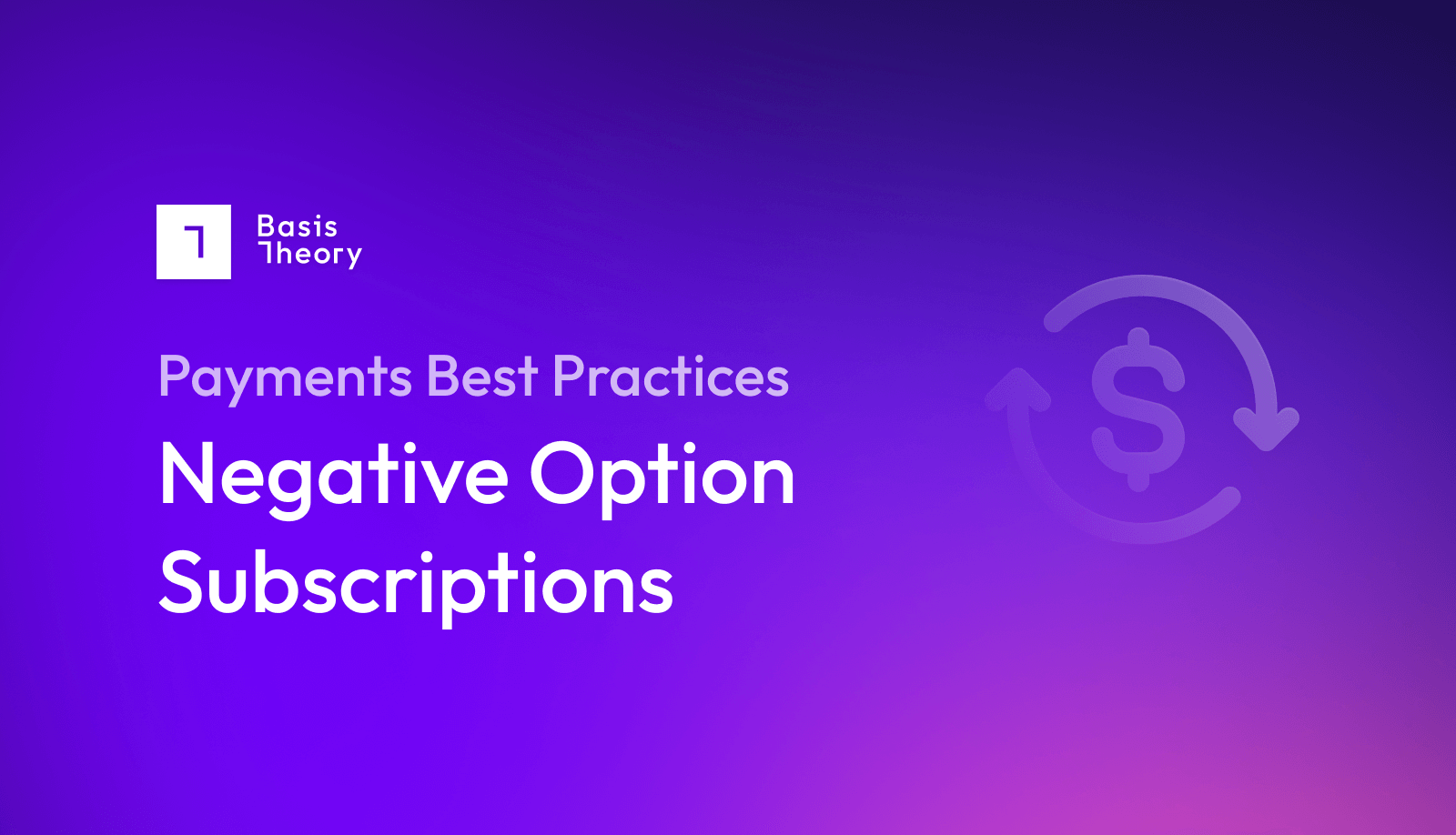Negative Option Subscriptions: Payments Best Practices

Negative option merchants are merchants that offer an enticing option for customers, like a free trial, that requires a credit card to sign up. The customer, in turn, has opted into paying for a subscription, and will be charged as such, and until cancellation, at the end of the promotional period.
Many businesses use this model, from product subscriptions (like subscription box companies) to digital streaming services, gym memberships to software-as-a-service products, and so forth.
What are the Payment Risks for “Negative Option” Merchants?
According to the Visa Integrity Risk Program (VIRP), subscription “negative option” merchants fall under MCC 5968, which is a tier 3 industry. The VIRP guide defines “Tier 3” as being of high integrity risk, with merchants operating businesses outside of Tiers 1 and 2, and bringing higher risk for non-compliance with applicable regulations without appropriate controls.
Therefore, merchants in this industry are categorized as “High-Brand Risk Merchants” or “high-risk merchants”. The primary risks here are that customers may not realize or remember they’ve opted into subscription which may cause them to initiate a chargeback when the billing occurs. Because of the potential for higher chargeback rates, some payment processors have increased scrutiny on businesses that follow this model.
Business and Sales Model Risks
Merchants in the “free trial” sales model may experience more prevalent business risks, which often makes PSPs apprehensive to do business with them.
The two primary risk factors into which issues may arise for free trial businesses include:
| Issue | Details |
|---|---|
| Customer Disputes | If customers feel misled or did not receive expected value, they may dispute the charge. If they were not informed about automatic renewals, they may dispute. |
| Fraud Potential | Malicious actors may sign up for services using stolen credit card information or attempt to abuse the free trial system. |
Best Practices of Successful “Negative Option” Merchants
It can be challenging to operate in a high-risk vertical due to the increased challenges of fraud, scrutiny, chargebacks, fees, and more. Implementing the right strategies, however, can ensure that these merchants not only operate successfully, but fully thrive.
Best practices high-risk merchants should follow to become successful include:
- Understanding industry regulations: Becoming knowledgeable about the standards that card networks and PSPs have in place regarding chargebacks and disputes, fraud prevention, reporting and compliance, and industry trends can ensure that your business remains operational even as the industry evolves.
- Choosing the right PSP(s): Partner with reputable and experienced payment processors that specialize in high-risk merchant accounts and have a history of working successfully with MCC 5968.
- Providing clear communication: Make it easy for prospective customers and partners to understand exactly what your business is, how the free trial process works, and what the terms of use are. It becomes significantly easier not only for you to fight for yourself in the event of fraud, but also for your partners to do the same.
- Provide clear steps to cancel: As much as merchants want to retain as many subscribers as possible, providing a clear path to canceling a subscription is the best way to reduce chargebacks. Indeed, there have been a number of studies that suggest negative option programs that have easily-executed cancellation processes actually enjoy higher retention than those who make canceling difficult.
- Offering best-in-class customer service: These days, great customer service should be table stakes for most businesses, and especially for merchants in high-risk sectors. Ensure that inquiries into refunds, cancellations, issues, or general questions are addressed promptly and clearly to keep chargebacks low.
- Maintaining PCI DSS compliance: Any merchant that handles sensitive card information must be PCI compliant. With several partners in the market that can assist, it is easier than ever to achieve compliance.
- Monitoring transactions and alerts: Regularly review transaction data to identify trends, patterns, and anomalies that may indicate potential fraud - and pay close attention to any alerts your payment partners share. High-performing merchants diagnose and address issues before they ever threaten business continuity.
- Leveraging specialty partners: Managing payments in a highly regulated environment is not the time or place to DIY or “figure it out”. Enlist trusted partners with expertise to assist with fraud management, compliance, security, and analytics.
How Basis Theory Helps “Negative Option” Merchants
Basis Theory can assist high-risk merchants that would like to secure their payments, achieve PCI compliance, and maintain ownership over their payments data. Outsourcing your CDE to Basis Theory not only takes away a significant portion of the burden to maintain compliance, but it also provides freedom in the form of network-agnostic tokens that growing merchants can use with any PSP, partner, or network.
Basis Theory helps customers like Passes, a Miami-based creator platform that enables fans to access exclusive content and experiences. Passes has a similar business model to OnlyFans or Fansly, empowering creators to monetize on their own by enabling seamless and secure transactions between creators and their fans.
Patrick Zheng, Tech Lead, recalled, "We were working with a PSP, and they said they were okay with our business but they ended up going back on their word and shutting us off without any warning." Passes had to quickly integrate with another payment provider in the middle of the night, but there was a risk they would be shut down there too. He continued, "We wanted to make sure that we're always in a position where we will have a provider even if something happens."
The Passes team replaced the front-end component with the Basis Theory card Elements and used the Basis Theory Proxy to send data to PSPs. The implementation process only took two weeks. Passes was able to build a solid foundation for its payment system, and open the door for cascading payments, ensuring it would always be in a position to have a provider to process transactions for its platform. Read the entire case study or contact us to chat with one of our payment experts if you would like to learn more.
.png?width=365&height=122&name=BTLogo%20(1).png)



